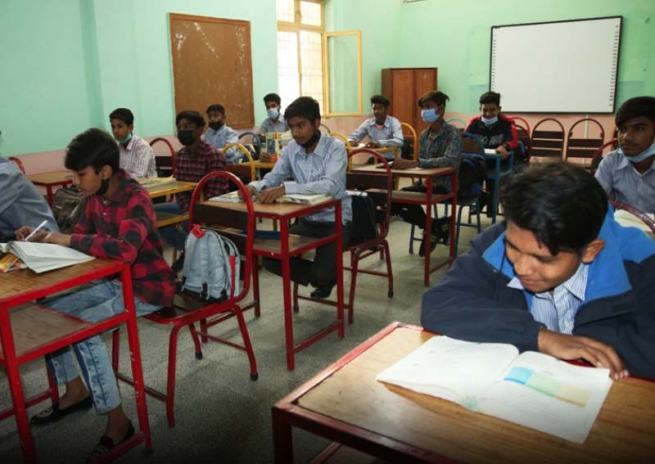Offering quality education, accessible and convenient for the most disadvantaged families has been the goal of the Sons of Don Bosco in Pakistan since their arrival in the country in 1998. For this reason, first in Quetta and then in Lahore, the Salesians have developed a formal and informal education project, which also includes Vocational Training.
“We try to offer quality and innovative education. The Pakistani education system is focussed on memorizing and reproducing, focused only on the ideas to get to know, while we try to awaken also the skills of the students. For this reason, in recent months we have installed interactive multimedia boards in almost all the classrooms,” says Fr Gabriel Cruz, a Mexican Salesian missionary who has been active in Lahore for three years. In fact, the “Don Bosco” Technical and Youth Center in Lahore is considered the country’s best.
In Salesian schools, attention is paid not only to the formation of students, but also to providing economic benefits, scholarships and accommodations for students from the poorest families.
In Lahore, the Salesians offer three-year programs in Mechanical Engineering, Information Technology and Electrical Engineering. There are also one-year courses in Welding, Refrigeration and Air Conditioning, Plumbing, Carpentry, Electricals and a Diploma in Information Technology. Finally, there is the possibility of shorter courses, lasting 6 months, for hairdressers, beauticians and make-up artists.
The Don Bosco schools in Quetta are attended by 600 pupils, of whom almost half are girls and the vast majority are Christians. In addition, the boarding schools house 30 boys and 20 girls. In Lahore, the formal education system welcomes 200 students, while there are 250 students in Vocational Training courses and 150 young people housed in the hostel.
As in any Salesian work, the courtyard or playground is an important element in education: “We offer outdoor activities, music, theater, cinema and sports competitions,” says the Salesian missionary.
Pastoral care and humanitarian work also have an important place in the daily work of the Salesians in Pakistan, focusing on the needs of the population in the midst of natural disasters and the distribution of food and hygiene kits during the pandemic.
The future does not hide its challenges and difficulties: “We need help because we find it hard to pay the salaries of teachers as the beneficiaries are poor. We intend to develop a program of infant nutrition in schools and another project for free school transport for those students who come come to our schools every day from over 30 kilometers away,” the Salesians emphasize.


